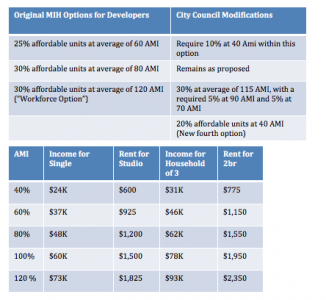
CB 1 discussing the amendments last fall
March 15, 2016 By Jackie Strawbridge
The City Council has reached a compromise with Mayor Bill de Blasio on two zoning amendments that are crucial to his affordable housing plan for the City.
The zoning amendments, called Mandatory Inclusionary Housing and Zoning for Quality and Affordability, were designed to promote the construction of affordable housing and high quality developments.
However, local communities including in western Queens found numerous problems within the zoning amendments, on top of a fundamental concern with the City’s push to create more housing in already crowded neighborhoods.
The Council has “heard New Yorkers loud and clear,” in the words of Speaker Melissa Mark-Viverito, and offered numerous modifications to the original MIH and ZQA proposals.
MIH requires developers to include affordable housing units in their projects, if building on land that has been rezoned to increase housing capacity. As a part of their compromise with the Mayor, the Council added requirements to MIH that lowers the income levels that would be incorporated into these developments.
 The Council also created a new way for developers to build affordable housing that accommodates families making around $31,000 per year – lower than the income brackets included in the original MIH proposal.
The Council also created a new way for developers to build affordable housing that accommodates families making around $31,000 per year – lower than the income brackets included in the original MIH proposal.
Astoria’s Community Board approved MIH and ZQA last November, albeit with numerous stipulations.
Some of those stipulations align with elements of the Council’s compromise.
The Council deal attempts to de-incentivize the construction of off-site affordable housing, which is permitted through MIH and which had raised a red flag for CB 1.
New rules state that offsite housing must produce five percent more affordable units, and developers will not be granted additional height for their market-rate projects if they put affordable housing offsite.
CB 1 wanted to add restrictions on a “payment in lieu” option that allows developers to pay into a fund rather than building on-site affordable housing. The Council left this component mostly untouched but did call for a report on the use of payment in lieu.
Within ZQA, the elimination of certain parking requirements at affordable housing in districts that are served by public transportation was a major source of contention for CB 1.
The Council is working to carve out modifications to the “transit zone” defined by ZQA where these parking reductions applied. A spokesperson said that the re-drawn maps are still being drafted.
While these modifications tailor MIH and ZQA to local concerns, the endgame remains the creation of new housing stock in New York, which has put western Queens residents on edge for months.
CB 1 had stipulated in its approval of MIH that any rezoning should be accompanied by an upgrade in infrastructure, such as schools, utilities or mass transit, which does not come into play in the Council’s deal with the Mayor.
The City Council is expected to vote on the revised housing plan next week.
Council Member Costa Constantinides said he supports the zoning amendments as they stand now. He cited the widened income levels and emphasis on on-site affordable units among reasons he supports the plan.
“The Council’s agreement on the new Mandatory Inclusionary Housing and zoning proposals will ensure that our city meets the demands of housing in the 21st Century,” he said in a statement. “The two Community Boards in our district, CB1 and CB3, are the only two in Queens that approved the proposals last year. This agreement addresses many of their concerns and builds on their meaningful input. The overall plan will bring us forward in our efforts to keep our city affordable for working families and seniors.”





